Much of the feels I got from this film relies on the fearless performance by actress Aleksandra Cwen who plays the adult Albrun. While much of this film is without dialog, she conveys every ounce of tragedy and horror with her facial expressions, hypnotic gait, and body language. This film is a one woman show and Cwen bears the weight expertly. (Mark L. Miller)
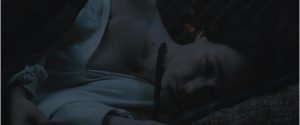 A grown Albrun, played brilliantly by Aleksandra Cwen. Cwen, being given very little dialogue in the movie, uses her expressive face (especially her eyes) to great effect; particularly during the goat-milking/masturbation scene and, later, a devastating rape scene in which she manages to convey both despair and dissociation without uttering a word. (Damian Blade/Ithaca Fantastik Film Festival)
A grown Albrun, played brilliantly by Aleksandra Cwen. Cwen, being given very little dialogue in the movie, uses her expressive face (especially her eyes) to great effect; particularly during the goat-milking/masturbation scene and, later, a devastating rape scene in which she manages to convey both despair and dissociation without uttering a word. (Damian Blade/Ithaca Fantastik Film Festival)
Aleksandra Cwen is quite remarkable as grown Albrun. Watching her psyche splinter into pieces is a ferocious viewing experience. (Joe Bendel/Chicago Cinepocalypse)
The cast here is composed of very few actors and the entire film revolved around the character of Albrun, the lead, played by Aleksandra Cwen who gives a sometimes poignant, sometimes chilling performance. Her work here is one that pulls the viewer in, gradually making them care for her character more than they even did for her character as a child and she makes the viewer’s impression of her change gradually, going back and forth between being sad for her and being puzzled as to why she is doing what she is doing. Her performance is central to the film and keeps it working throughout. (Emilie Black/Ithaca Fantastik Film Festival)
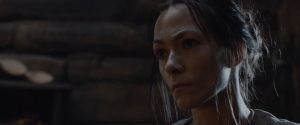 Feigelfeld invites viewers into Albrun’s fractured psyche and it is a wild ride to take while enjoying some truly stunning imagery and fantastic performances (most notably the anchor of the film, Aleksandra Cwen as adult Albrun). (Rob Dean/Daily Grind House)
Feigelfeld invites viewers into Albrun’s fractured psyche and it is a wild ride to take while enjoying some truly stunning imagery and fantastic performances (most notably the anchor of the film, Aleksandra Cwen as adult Albrun). (Rob Dean/Daily Grind House)
Writer and director Lukas Feigelfeld keeps the viewer shrouded in mystery. The Alps provide a rugged, mysterious and dangerous spectre; casting a dark shadow over every scene. The sound design subtly builds up atmosphere whilst Cwen is a hypnotic screen presence. (Rob Aldam/Back Seat Mafia)
Aleksandra Cwen is faultless as the adult Albrun, in one of the more challenging performances in my recent memory. (Thomas Johnstone/Madeupwords)
Cwen is wonderful as Albrun. Because the film is almost devoid of dialogue, Cwen has the tough task of portraying her torment through body language and facial expressions alone. (Sarah Jane/Talk Film Society)
 – The film then rejoins Albrun fifteen years later as an adult (this time portrayed in my favorite performance of the film by Aleksandra Cwen). (Liam O’Donnell/Cinepunx/Brooklyn Horror Film Festival)
– The film then rejoins Albrun fifteen years later as an adult (this time portrayed in my favorite performance of the film by Aleksandra Cwen). (Liam O’Donnell/Cinepunx/Brooklyn Horror Film Festival)
Aleksandra Cwen’s performance as the adult Albrun is nothing short of powerful, played to perfection by Cwen. Even the timidity that Albrun displays when she interacts with the villagers is a complete portrayal of someone who has been beaten down one too many times, thus making the moment she snaps that much more frightening and real. (Tyler Hixson/Library Journal/Brooklyn Horror Film Festival)
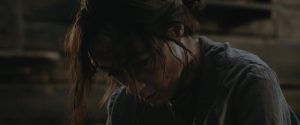 I think that Aleksandra Cwen does a very good job here as the lead considering her lack of dialogue. Her performance is built up primarily of facial expressions like Martini’s. She conveys a true sense of loneliness and pain throughout and as soon as she makes a friend you see subtle changes in her body language that signify her improving happiness. The film demands a lot from her, moving far away from normal conventions and presenting some truly shocking and controversial scenes that may have a put a lot of actresses off. Her energy and commitment is commendable and I wouldn’t be surprised if she made an appearance in a few more films in the next few years. (Joshua Woods/Sova v Cinema/BFI London Film Festival)
I think that Aleksandra Cwen does a very good job here as the lead considering her lack of dialogue. Her performance is built up primarily of facial expressions like Martini’s. She conveys a true sense of loneliness and pain throughout and as soon as she makes a friend you see subtle changes in her body language that signify her improving happiness. The film demands a lot from her, moving far away from normal conventions and presenting some truly shocking and controversial scenes that may have a put a lot of actresses off. Her energy and commitment is commendable and I wouldn’t be surprised if she made an appearance in a few more films in the next few years. (Joshua Woods/Sova v Cinema/BFI London Film Festival)
The film’s four sections tell the story of Albrun (a captivating turn from Aleksandra Cwen), living in a shack on the outskirts of a village and regarded as a witch like her mother before her. (Martin Plumbridge/Unwordly Views/BFI London Film Festival)
Casting in the film is great; Aleksandra Cwen brings a haunting quality to Albrun which is most apt. (I Heart The Talkies/BFI London Film Festival)
The bulk of the film takes place about 20 years after the mother dies, and an adult Albrun (Aleksandra Cwen in a downright fearless performance) now has a baby of her own. From childhood to the present, a dark, supernatural force seems to hover around Albrun and her cabin, and as local villagers continue to taunt and then physically harm her, she begins to succumb to that dark force — or is this diabolical presence merely in her mind? (Joseph Perry/That’s Not Current/Brooklyn Horror Film Festival)
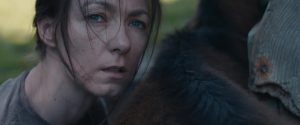 Its nuanced lead performance from Aleksandra Cweny and accompanying ambiguity leaves it open for multiple interpretations, and cumulatively, makes it one to search out for those audiences with a stronger stomachs. (Mike Ross/Film Seekers/BFI London Film Festival)
Its nuanced lead performance from Aleksandra Cweny and accompanying ambiguity leaves it open for multiple interpretations, and cumulatively, makes it one to search out for those audiences with a stronger stomachs. (Mike Ross/Film Seekers/BFI London Film Festival)
Jump forward twenty years, Auburn (now played by Aleksandra Cwen, a force of nature) still lives in the same cabin, with an infant daughter of her own, herding goats and producing milk and cheese… With scarce dialogue, Aleksandra Cwen is left with the difficult task of portraying Auburn realistically, which she manages with just her facial expressions and a strong screen presence. (Marko Stojiljković/Cineuropa)
But Hagazussa isn’t quite a horror film and it isn’t long before there’s a jump in time and we’re following Albrun as a full-grown adult (played with cold intensity by Aleksandra Cwen) with a child of her own (the father is unknown), stuck in the same position as her mother. (Patrick Ripoll/Voices Visions/Chicago Cinepocalypse)
Hagazussa: A Heathen’s Curse, which is set in 15th-century Austria and centres on Aleksandra Cwen, a twentysomething single mother whose own mother. (David Parkinson/Oxford Times)
We forward 20 or years to see Albrum as an adult – Aleksandra Cwen taking over acting duty – still working the goats, living alone in her mother’s house now with a small baby. (Colin Lomas/Vulture Hound)
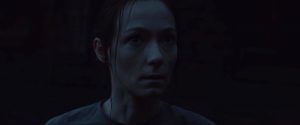 And, as Hagazussa: A Heathen’s Curse amplifies its feeling of foreboding — progressing from instant trepidation to unbridled anxiety and beyond — an actress bears the movie’s pain and suffering in her stunning performance. Feigelfeld may craft a gripping manifestation of deep-seeded unease infecting and shaping a woman’s life, but the talented Cwen gives that atmospheric sensation flesh and blood. Boasting an expressive face perfectly suited to the feature’s lack of dialogue, hers is portrayal that wears the weight of female oppression in every pained look. Crucially, she’s also Hagazussa: A Heathen’s Curse’s beating heart beneath its tantalisingly bleak exterior, conveying a fiery spark of subversive rebellion amidst the overwhelming darkness as well. (Sarah Ward/Goethe Institut)
And, as Hagazussa: A Heathen’s Curse amplifies its feeling of foreboding — progressing from instant trepidation to unbridled anxiety and beyond — an actress bears the movie’s pain and suffering in her stunning performance. Feigelfeld may craft a gripping manifestation of deep-seeded unease infecting and shaping a woman’s life, but the talented Cwen gives that atmospheric sensation flesh and blood. Boasting an expressive face perfectly suited to the feature’s lack of dialogue, hers is portrayal that wears the weight of female oppression in every pained look. Crucially, she’s also Hagazussa: A Heathen’s Curse’s beating heart beneath its tantalisingly bleak exterior, conveying a fiery spark of subversive rebellion amidst the overwhelming darkness as well. (Sarah Ward/Goethe Institut)
Sure it is minimalistic in tone and the cast is very small, the film often being carried solely on the back of principle actress Aleksandra Cwen who puts in a remarkable performance. The acting and direction is brilliant. (Pete Woods/Ave Noctum)
In other scenes, like in Polanski’s „Disgust“ or „Zuławski’s Possession“, we will see a portrait of an emotionally damaged person. Density of virtue, devastated purity. The events taking place on the screen often seem not so much about surrealism, but about madness – this one, performed by Aleksandra Cwen, looks with bated breath, sometimes even with admiration, in a moment to feel the total hatred and contempt for Alburn played by her. The actress incredibly fulfilled her role, the expression of her character can certainly be included in the group of those that are hard to forget. Emotional charge, which was presented by the main character performer, is difficult to accept and unambiguous understanding. The whole story, unfolding in the wild heart of unusually charming mountains, is unbelievably incredible and it is hard not to assume that everything we are witnessing is not a devilish intrigue, but a mere mental illness – once again questioning the essence of supernatural forces to emphasize the inner animalisation human nature. The heroine is in constant conflict with herself, the world, God – are we the only ones who decide about our fate, is it a fate? Or maybe we love to stick to the roles imposed on us, and the real changes are too devastating? (Maciej Jędrejko/Mortal)